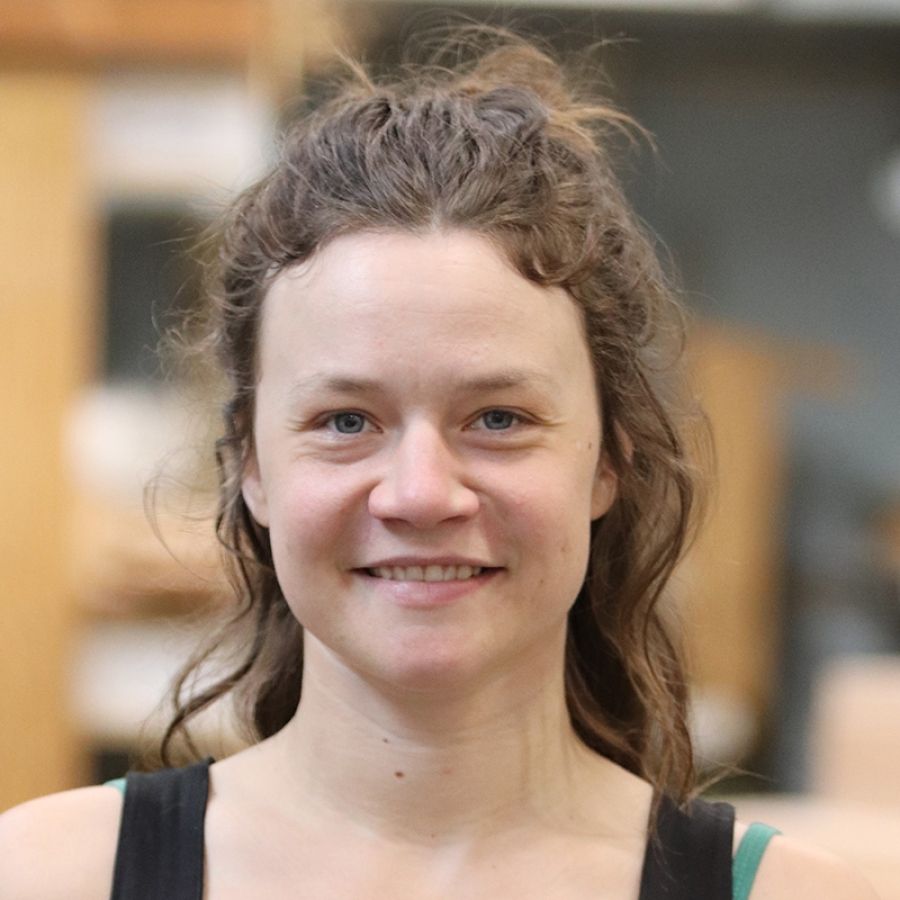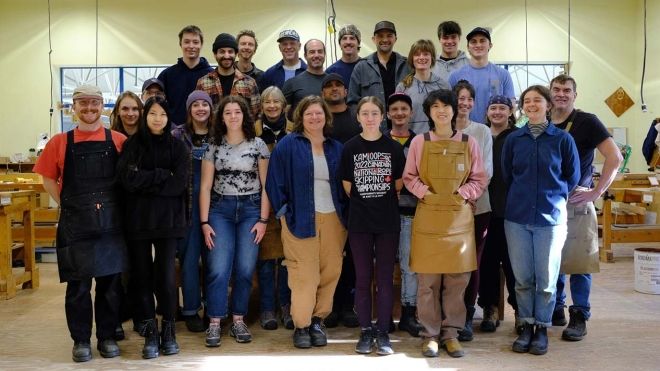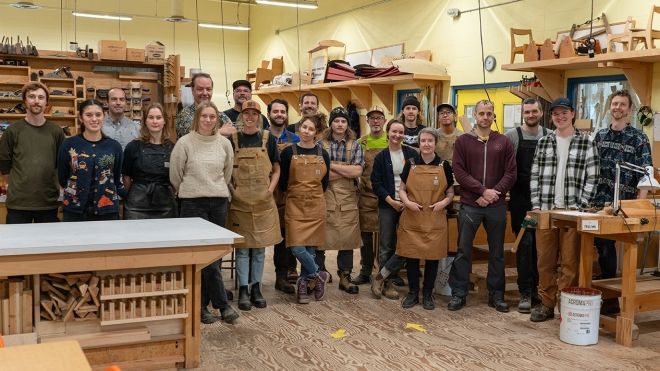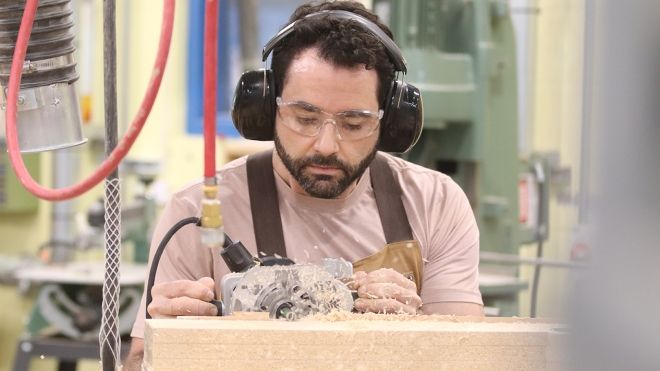Fine Woodworking - Certificate
Overview
In our supportive and creative environment, you’ll have unique opportunities to gain a solid foundation in this refined profession. We’ll teach you woodworking operations basics and technological advancements to develop your interests and perfect your craft.
This nine-month program prepares students for apprenticeship positions in the cabinet makers (joiners) trade or for careers as fine furniture builders.
Students engage in a variety of classroom and shop activities. They learn theoretical principles, concepts and theories of furniture and cabinet design in the classroom. They apply their knowledge in the shop where they construct cabinets and fine furniture.
*This program may be eligible for the post-graduation work permit (PGWP).
Practical Skills Training
- Appreciate balanced design
- Consistently strive for originality and quality
- Draft in Computer Automated Design (CAD)
- Exhibit product value and pride
- Photograph your work
- Plan and set up a professional show
The program is broad in scope and encourages students to strive for quality design, originality and enhanced workmanship skills, to improve chances of success in the marketplace.
Students are responsible to pay for materials used in constructing their projects. Depending on the size and scope of their project, this cost could be up to $1,000.
Graduates of the Fine Woodworking Program at Selkirk College earn credit for Level 1 and Level 2 of the cabinet maker (joiner) trade technical training component of their apprenticeships. Additionally, graduates receive 475 hours advance credit toward the on-the-job component of an apprenticeship.
Youth Train in Trades
Youth Train in Trades is a program designed to help secondary school students get a head start on careers in the trades while earning credit toward their high school graduation. Learn more online at Skilled Trades BC.
For more information, speak with your high school guidance counsellor or get in touch with Selkirk College’s Industry and Trades administrative assistant.

News
Program Outcomes
Cabinet Maker (Joiner) Level 1
Upon successful completion of this program, learners will be able to:
- Use safe work practices
- Apply standard drafting practices
- Apply layout techniques
- Use quality standards
- Communicate with others
- Select materials
- Use basic hand tools
- Use portable power tools
- Use woodworking machines
- Assemble products
- Prepare wood surfaces for finishing
Cabinet Maker (Joiner) Level 2
Upon successful completion of this program, learners will be able to:
- Apply layout techniques
- Use quality standards
- Read blueprints and specifications
- Apply computer skills
- Select materials
- Use basic hand tools
- Use woodworking machines
- Use assembly techniques
- Construct sashes, doors and frames
Fine Woodworking
Upon successful completion of this program, learners will be able to:
- Demonstrate safe work habits
- Describe WHMIS and WCB regulations concerning the handling, storage and use of wood finishing products
- Safely use and maintain hand tools and woodworking machines
- Plan and complete a variety of woodworking projects using various pieces of equipment
- Organize the woodworking process efficiently and effectively
- Design and make jigs
- Use a variety of wood bending processes
- Outline the advantages and disadvantages of using veneering techniques
- Describe and explain the major components of wood
- Finish wood and make minor repairs to wood finishes
- Outline and explain the furniture design process
- Develop manual and computer-generated drafts of furniture designs
- Construct and install kitchen cabinets and countertops
- Properly install cabinet hardware
Admission Requirements
- Graduation from a British Columbia Senior Secondary School or equivalent
- Workplace Math 11, or Selkirk AUD Math 46, with a minimum of 60% or better
- Consideration will be given to mature individuals (19 years or older) who are not senior secondary school graduates, provided they are working to complete the recommended education:
- Grade 10 or equivalent including English 10, Mathematics 10
- Grade 12 preferred - All applicants are required to complete a computerized placement test in reading, writing and mathematics once they have submitted their application.
- Employers may require higher level of Math as part of their hiring policies
- Basic computer skills are highly recommended
General
a) Applicants must submit a completed admission application form and other required documents (i.e. secondary school and any post-secondary transcripts) to the admissions office, Selkirk College.
b) Applicants are required to complete pre-admission College Readiness Tool (CRT) assessment for reading, writing and mathematics. (Except Second Year Specialty Program)
c) Consideration will be given to mature students (see below).
Mature Student (see Policy 8611: Admissions)
a) A "mature student" is at least 19 years and has been out of the school system for at least one year on or before the first day of classes of the program.
b) A mature student with reasonable potential for success on the basis of work experience or other criteria may be admitted, notwithstanding some deficiency in prior formal education, at the School Chair’s discretion.
c) A mature student shall normally meet the specific program or course prerequisites.
Fine Woodworking Second Year Specialty Program applicants must have completed the First Year Fine Woodworking program with a “B” grade or better in each course and must have demonstrated significant ability, interest and dedication during the first year of study.
SELECTION
Applications will be separated into two levels as identified in Selkirk College Policy 8611: Admissions, namely "fully qualified" and "partially qualified".
1. Fully Qualified
The applicant meets all of the requirements stated in Part I, A, above.
2. Partially Qualified
The applicant is deficient in meeting some or all of the admission requirements stated in Part I, A, above.
3. Order of Selection see Policy 8611: Section 5.2 (8) & (9)
APPLICATION PROCEDURE
1. Before an applicant's file is considered to be complete, the following must have been received by the Admissions office:
a) Completed application form.
b) Official transcripts of high school grades (an interim statement of grades is acceptable if applicant is currently a student).
c) Official transcripts of all post-secondary education grades.
d) The results of College Readiness Tool.
2. Applications for admission will be received until program is full.
3. An interview (in person or by telephone) with the School Chair or designate may be required before entry to the program. Interview results are not used as criteria for admission.
In order to receive your credential in your program, you must maintain a minimum of 70% average.
1. To graduate and receive the Selkirk College Fine Woodworking Program Certificate of Completion, the student must achieve a minimum grade of 70% in each of the following courses:
2. To receive the Fine Woodworking Second Year Specialty Program Certificate of Completion, the student must meet the goals and learning outcomes iterated in the Pre-Enrollment Learning Activity Proposal.
PROMOTION
Students should keep records of their grades and strive to maintain a Progress Grade of 70% or better. Students should be aware of their Progress Grade at all times.
NOTE: Students who fail to meet all of the Selkirk College Fine Woodworking Program graduation requirements may earn ITA credit for Level One and Level Two Cabinet Maker (Joiner) apprenticeship technical training.
NOTE: Courses of study, course content, course weightings, and learning outcomes for Fine Woodworking Program classes are prescribed by the BC Industry Training Authority (ITA) and subject to change without notice.
Tuition & Fees
All amounts are estimates and are subject to change. Tuition amounts are based on a full-time course load. Please note that many programs have additional costs beyond those listed here. For more information, please visit Tuition & Fees.
Find Out More
We look forward to connecting with you! Fill out this form and we'll reach out to you.



